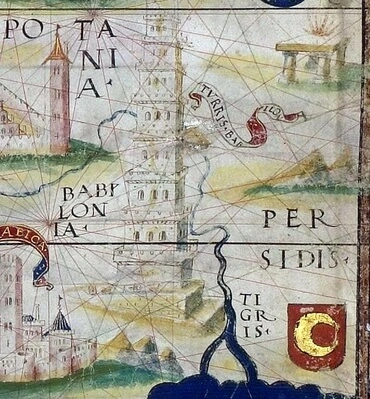Babylon (Babel)

Babylon was an ancient city built on the Euphrates river in what is now southern Iraq. It once was the capital of a great empire which at one point conquered the land of Judah as mentioned in the second book of Kings and in Daniel. But the river changed its course and the city was abandoned long ago. Both the historic city in Mesopotamia and the parable city with its tower, mentioned in Genesis, represent the same thing, a worship that appears holy in externals, while the internals are profane. This representation expands to mean a church whose leaders use this kind of worship to gain dominion over others for their own gain and for the gain and power of the church. The city itself is the doctrinal structure that supports this kind of worship and dominion.
(References: Apocalypse Explained 1029; Arcana Coelestia 1283, 1302, 1304, 1310, 1311)
God

When the Bible speaks of "Jehovah," it is representing love itself, the inmost love that is the essence of the Lord. That divine love is one, whole and complete in itself, and Jehovah also is one, a name applied only to the Lord. The divine love expresses itself in the form of wisdom. Love, then, is the essence of God -- His inmost. Wisdom -- the loving understanding of how to put love into action -- is slightly more external, giving love a way to express itself. Wisdom, however, is expressed in a great variety of thoughts and ideas, what the Writings collectively call divine truth. There are also many imaginary gods, and sometimes angels and people can be called gods (the Lord said Moses would be as a god to Aaron). So when the Bible calls the Lord "God," it is in most cases referring to divine truth. In other cases, "God" has reference to what is called the divine human. The case there is this: As human beings, we cannot engage the Lord directly as divine love. It is too powerful and too pure. Instead, we have to approach Him by understanding Him through divine truth. Divine truth, then, is the Lord in human form, a form we can approach and understand. Thus "God" is also used in reference to this human aspect, because it is an expression of truth.
This video is a product of the New Christian Bible Study Corporation. Follow this link for more information and more explanations - text, pictures, audio files, and videos: www.newchristianbiblestudy.org
This video is a product of the New Christian Bible Study Corporation. Follow this link for more information and more explanations - text, pictures, audio files, and videos: www.newchristianbiblestudy.org








